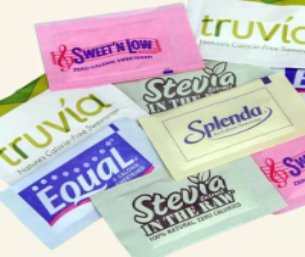Artificial sweeteners are chemical or plant-based substances used to sweeten foods and drinks without adding calories.

✅ Aspartame, found in brands like Equal and NutraSweet, is made by combining two amino acids—phenylalanine and aspartic acid—through a laboratory process. It is about 200 times sweeter than sugar and is commonly used in diet sodas and sugar-free products.
✅ Saccharin, one of the oldest artificial sweeteners, was discovered in the late 1800s and is synthesized from chemicals found in petroleum derivatives. It is used in Sweet’N Low and is around 300 times sweeter than sugar.
✅ Sucralose, the main ingredient in Splenda, begins as regular sugar but is chemically altered by replacing three hydrogen-oxygen groups with chlorine atoms. This change prevents the body from metabolizing it, so it passes through without adding calories. Although derived from sugar, sucralose is considered an artificial sweetener due to its chemical processing.
✅ In contrast, Stevia is extracted from the leaves of the Stevia rebaudiana plant, a shrub native to South America. Its active compounds, steviol glycosides, are 200–400 times sweeter than sugar and do not raise blood sugar levels.
✅ Other sweeteners like acesulfame potassium and neotame are also lab-created and are used in a wide variety of processed foods and beverages. While these sweeteners provide a sugar-free option for people managing weight or diabetes, their safety and long-term health effects remain a topic of ongoing research and debate.
Safety profile and Medical Disclamers
Most artificial sweeteners like aspartame, sucralose, saccharin, and acesulfame potassium are approved by regulatory agencies such as the FDA and considered safe when consumed within recommended limits.
Aspartame, in particular, is not safe for people with phenylketonuria (PKU), a rare genetic disorder. (Medical Disclaimer).

